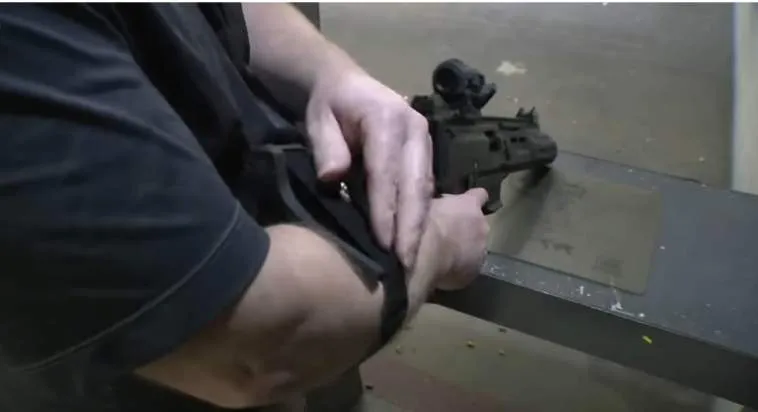(Western Journal) President Joe Biden and the Democrats may not be able to get any kind of sweeping gun legislation through Congress, but they can try to make life as difficult as they can for law-abiding gun owners — and that, one prominent gun-rights attorney says, may have led to a massive trap thanks to a new rule from the Biden administration’s Bureau of Alcohol, Tobacco, Firearms, and Explosives.
In a Jan. 13 media release, the Department of Justice announced it was submitting a rule to the Federal Register that would force owners of pistol stabilizing braces to treat them as short-barreled rifles.
The release claimed said the rule “makes clear that when manufacturers, dealers, and individuals use stabilizing braces to convert pistols into rifles with a barrel of less than 16 inches, commonly referred to as a short-barreled rifles, they must comply with the laws that regulate those rifles, including the National Firearms Act (NFA).”
“Keeping our communities safe from gun violence is among the department’s highest priorities,” Attorney General Merrick Garland said in the news release. “Almost a century ago, Congress determined that short-barreled rifles must be subject to heightened requirements. Today’s rule makes clear that firearm manufacturers, dealers, and individuals cannot evade these important public safety protections simply by adding accessories to pistols that transform them into short-barreled rifles.”
It’s unclear when this latest assault on the Second Amendment in the name of safety will actually take place. According to the news release, the rule goes into effect on the day it’s published in the Federal Register. As of Monday morning, it had not been.
But regardless of when it happens, there are already plenty of ways this rule could be easily turned into an enforcement nightmare for those looking to parse what is and isn’t covered under the new criteria. (Given that it spans a solid 293 pages in final form, understanding it all is hardly a simple matter.)
However, speaking to popular pro-Second Amendment YouTube channel “Guns & Gadgets” in an interview posted last week, attorney Stephen Stamboulieh with the Gun Owners of America argued the biggest trap isn’t written into the rule itself. Instead, it involves how short-barreled rifles are approved in the first place — and a very big problem for gun owners called the “88 marker.”
The issue starts with how a short-barreled rifle is made, Stamboulieh said. You start by getting a regular, long-barreled rifle and filling out what the ATF calls a Form 1 — actually form 5320.1, “Application to Make and Register a Firearm.”
“So you fill out all your paperwork right, you do all your fingerprints or photographs, you pay your $200 tax and you send it into the ATF,” Stamboulieh said. “You don’t have a short-barreled rifle, right? You just have a regular rifle.
“So in, what, six months to a year, 13 months, whatever it is, they issue your stamp, say, ‘Hey, you’re a good guy who can make this into a short-barreled rifle.’ And then you’re like, ‘yay!’ You buy your 7-inch up [upper assembly], 8-inch up, or whatever it is, you put it on there, and you build it at this point.”
Instead, by turning an estimated 40 million pistol braces into assemblies for short-barreled rifles, “it kind of flips the process around,” Stamboulieh said. “Because whoa, I’ve got a short-barreled rifle in front of me that you’ve now said is a short-barrel rifle.”
Now, millions upon millions of applications will flood the ATF to essentially “make” a short-barreled rifle, given that the rule stipulates owners of the braces have 120 days from when it takes effect to either register them (tax free!), surrender them, remove the brace or destroy them.
But therein lies the issue: The ATF is now the sole background-check runner when it comes to Form 1. And, as Stamboulieh said, “if that background check remains open for 88 days or longer, it’s an automatic denial.”
And, as the host of Guns & Gadgets noted, “With [the ATF’s] current level, Form 1s are taking six to eight months on a good day.”
Stamboulieh said he went to the ATF to see if maybe he was misinterpreting the rule. He approached someone with the agency and asked, as a lawyer, what would happen if his client had an open short-barreled rifle application after 88 days.
“She goes, ‘Um, we’ll take an enforcement action at that time,’” Stamboulieh said.
So, damned if you do register, damned if you don’t.
Given that the ATF seems more than happy to “take an enforcement action,” one can easily see how this could lead to armed raids. And a raid by armed ATF agents on armed gun owners who think — with some justification — that their rights are being trampled likely will end badly for all sides.
Meanwhile, as the lawyer noted, those who try to get their brace registered have given the feds “this nice shiny information on a list. And we know how much people in government love their lists.”






